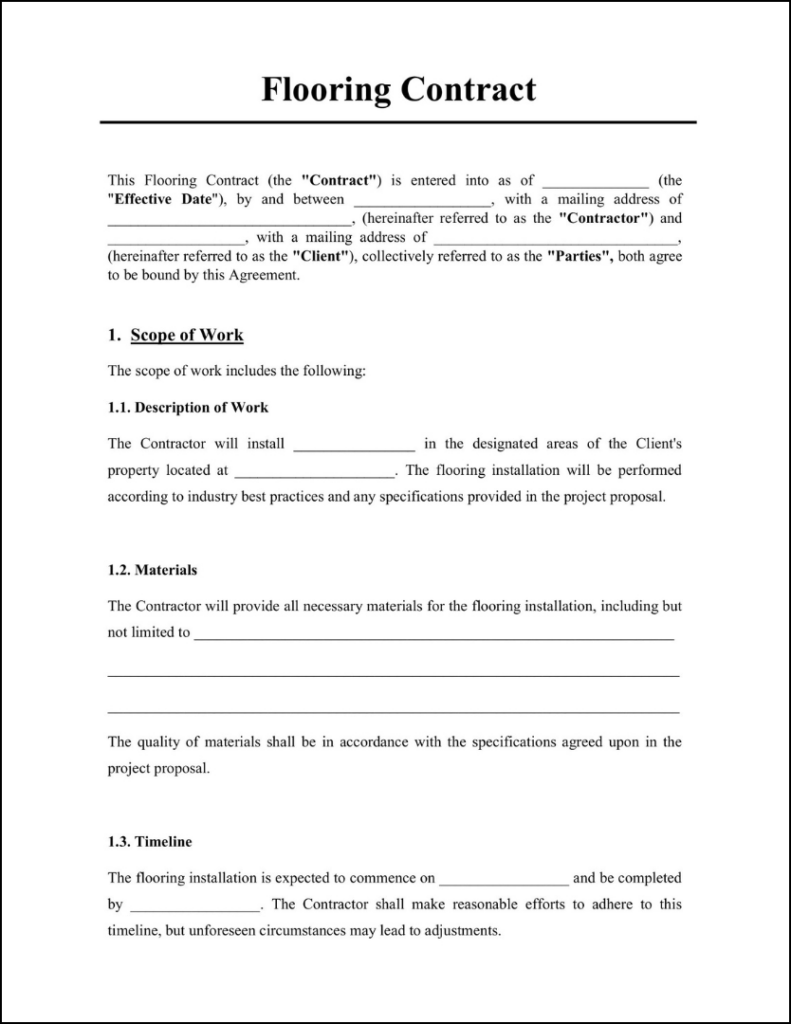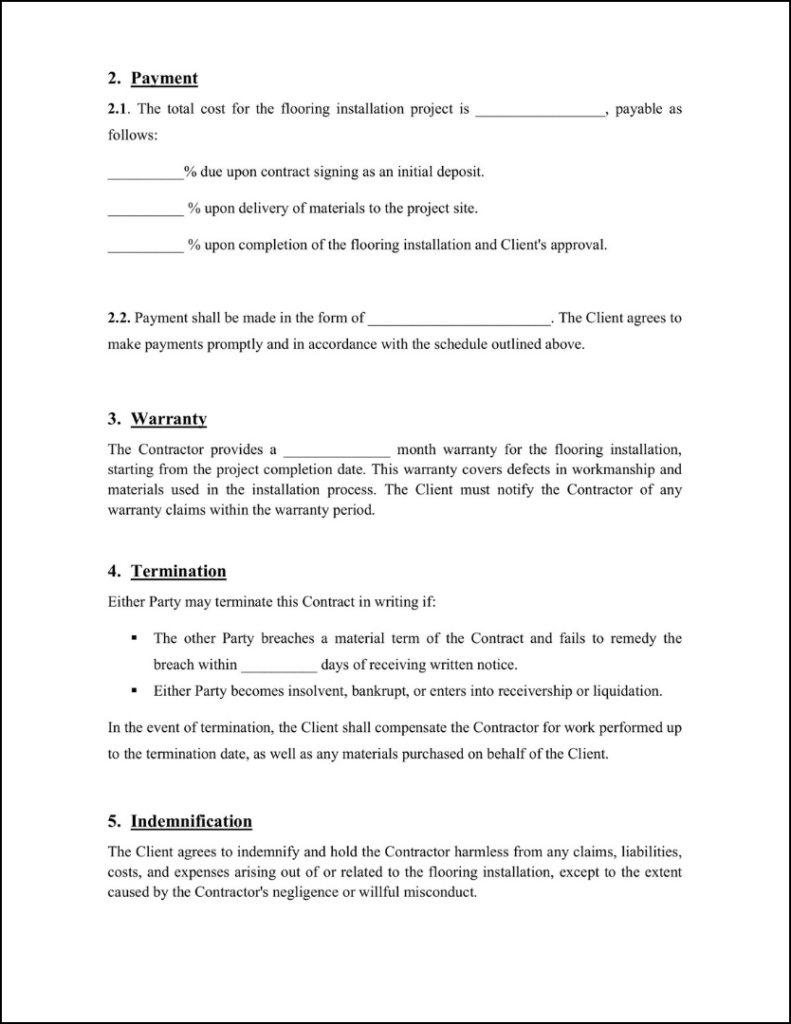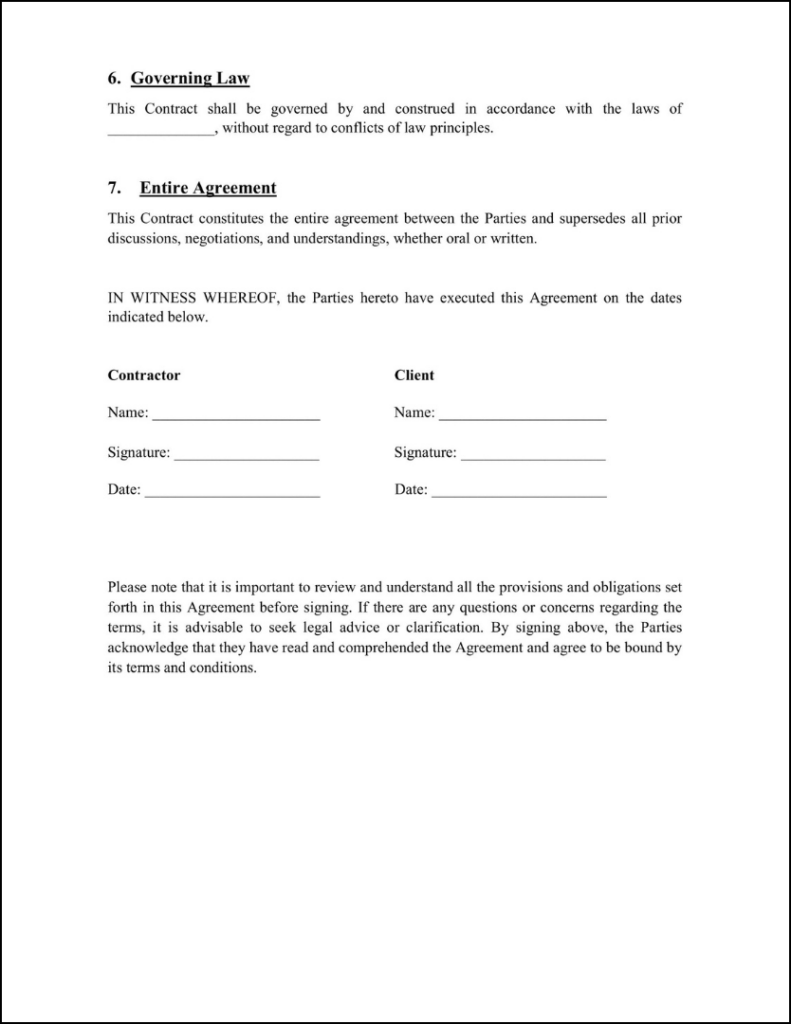Flooring Contract
If you’re seeking a professionally designed contract to facilitate a seamless flooring project, you’re in the right place. Our meticulously crafted templates encompass all the crucial elements of a flooring agreement, saving you valuable time and effort. Whether you’re a flooring contractor or a property owner, our templates provide a robust framework for the success of your project.
Our template also integrates industry best practices, ensuring that no detail is overlooked and your flooring endeavor progresses without a hitch. Waste no time! Download our Flooring Contract Template today and set yourself on the path to a successful and stress-free flooring experience.
What is a Flooring Contract?
A flooring contract is a legally binding agreement between a flooring contractor and a client, outlining the terms and conditions of a flooring project. It serves as an exhaustive document that defines the project scope, responsibilities, timelines, payment particulars, and other pivotal aspects of the project. Whether it’s a simple floor installation or a comprehensive flooring overhaul, a meticulously drafted flooring contract fosters transparency, minimizes misunderstandings, and establishes a solid foundation for a triumphant project outcome.
Typically Covered in a Flooring Contract
- Project Details
- Timeline
- Payment Structure
- Scope of Work
- Materials
- Warranties
- Change Orders
- Permits and Approvals
- Insurance Coverage
- Cleanup and Disposal
- Penalties and Termination
A well-constructed flooring contract encompasses these facets, guaranteeing that both the contractor and the client possess a crystal-clear comprehension of their respective roles and responsibilities throughout the project’s lifecycle.
Free Editable Flooring Contract Sample
Access our free Flooring Contract sample to safeguard your interests. Download now and take proactive steps toward a secure Flooring Contract at no cost.
Why is a Flooring Contract Vital?
The significance of a flooring contract extends well beyond its existence on paper. This pivotal document wields the power to shape the trajectory of a flooring project, ensuring smooth operations, mutual comprehension, and triumphant outcomes. Here’s why a flooring contract stands as a cornerstone in the realm of construction:
1. Laying Clear Terms
A flooring contract paves a distinct path for the project’s trajectory. It outlines the project scope, materials, timelines, and obligations of each party involved. By establishing terms from the outset, misunderstandings and confusion are mitigated.
2. Managing Uncertainties
Flooring projects are prone to uncertainties, such as unexpected subfloor issues or material variations. A robust contract allocates these uncertainties and outlines contingency plans, preparing both parties for any unforeseen challenges.
3. Navigating Legal Terrain
Beyond a mere agreement, a flooring contract holds legal weight. In case of disputes, a well-structured contract provides a sound legal foundation for resolution, conserving time and resources.
4. Fostering Trust
A flooring contract transcends a mere piece of paper; it’s evidence of professionalism. Presenting a comprehensive contract showcases your dedication to transparency and accountability, cultivating trust between you and your clients.
5. Defining Payment Terms
Precision in financial matters is paramount. A flooring contract thoroughly elucidates the payment structure—deposits, progress payments, and final payments. This reduces potential payment-related conflicts in the future.
6. Facilitating Communication
Effective communication is pivotal for successful projects. A contract acts as a communication conduit, ensuring all stakeholders are aligned, thereby averting misunderstandings and misinterpretations.
7. Dual Accountability
With a well-fashioned flooring contract, roles and expectations are unambiguously outlined. Contractors are held accountable for work quality and timeliness, while clients are bound to fulfill payment commitments.
8. Showcasing Professionalism
Manifesting your commitment to a comprehensive flooring contract underscores your professionalism and expertise. It positions you as a credible authority in your field, enhancing your industry reputation.
9. Guiding Project Management
In the intricate choreography of project management, a contract assumes the role of the choreographer. It maps out steps, timelines, and key milestones, ensuring harmonious task and resource execution.
10. Instilling Confidence
A skillfully designed flooring contract bestows assurance upon both parties. Clients can rely on agreed-upon terms, while contractors can focus on delivering quality work, unburdened by concerns about misunderstandings.
5 Tips for Crafting an Effective Flooring Contract
Constructing a robust flooring contract demands meticulous attention to detail and an in-depth comprehension of the project at hand. Here are five indispensable tips to guide you in creating an effective and impactful flooring contract:
1. Linguistic Clarity
Employ straightforward, comprehensible language throughout the contract. Avoid technical jargon that could perplex your client. The objective is to ensure both parties fully grasp terms and conditions sans ambiguity.
2. Elaborate Project Scope
Elucidate the project scope meticulously, breaking it down into specific tasks and responsibilities. This might encompass installation descriptions, material specifications, and additional services like subfloor preparation. A clear scope thwarts misunderstandings and serves as a reference during the project.
3. Transparent Payment Structure
Delimit the payment structure in the contract. Explicitly define amounts and due dates for initial deposits, progress payments, and the final payment. Incorporate any clauses concerning potential payment adjustments, such as modifications to the project or unforeseen delays.
4. Comprehensive Warranties
Address warranties for both materials and workmanship in the contract. Detail the extent and coverage of these warranties, outlining the procedure for clients to assert warranty claims if required. This instills confidence in your work and assures clients of your commitment to quality.
5. Change Order Protocol
Envision the potential for changes during the project and incorporate a well-outlined change order procedure. Define how changes will be proposed, and sanctioned, and their potential impact on project timelines and costs. This prevents scope creep and keeps expectations in check.
Remember, an effective flooring contract functions as a communication tool, a legal safeguard, and a roadmap for project success. By integrating these tips, you’ll formulate a document that not only safeguards your interests but also fosters transparency and trust between you and your clients.
FAQs Related to Flooring Contract Templates
Flooring Contract Sample Preview
Below is the downloadable sample of a Flooring Contract:
Disclaimer: Please note that the samples provided here are intended to serve as a helpful resource and should not be considered legal advice. It is important to consult with a qualified attorney or legal professional to ensure that any modifications or usage of these templates align with the specific laws and regulations applicable to your jurisdiction and circumstances. BunnyDoc disclaims any liability or responsibility for the consequences arising from the use or customization of these templates. It is the responsibility of the users to review and adapt these templates to their specific needs, and to seek legal counsel for their particular circumstances.


